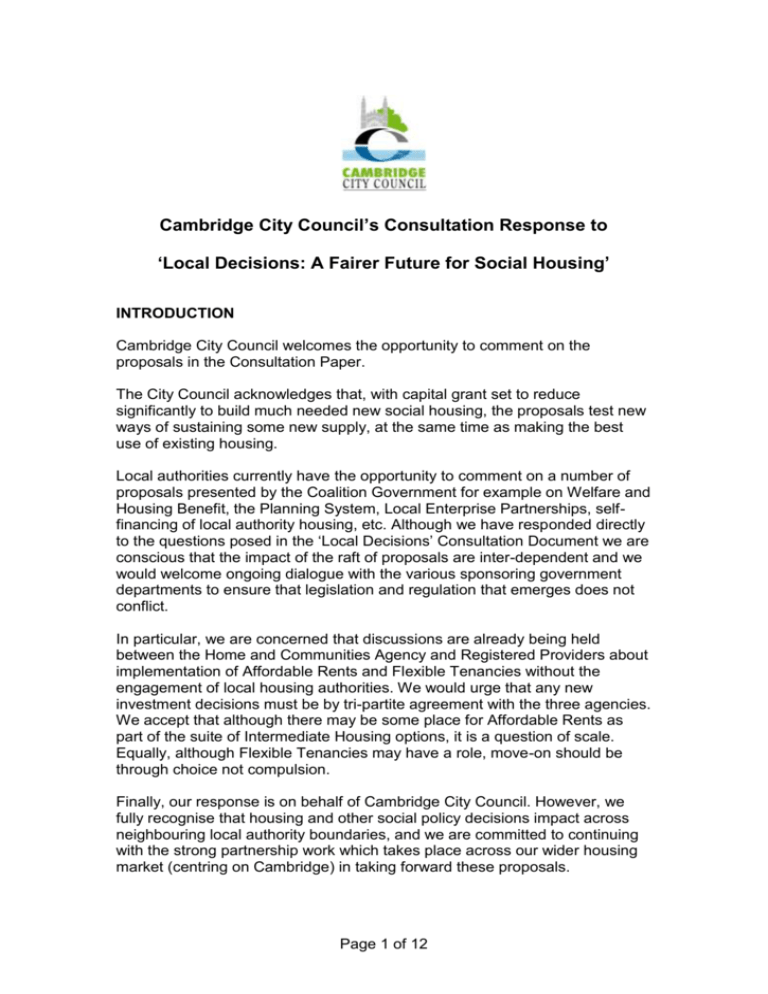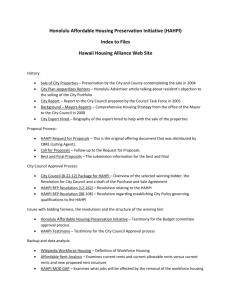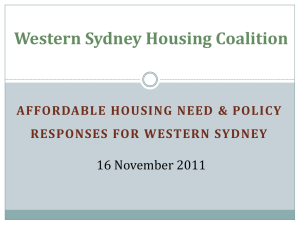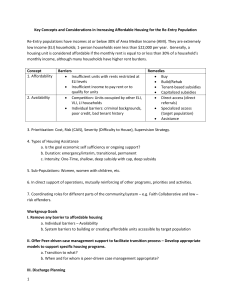Cambridge City Council - Defend Council Housing
advertisement

Cambridge City Council’s Consultation Response to ‘Local Decisions: A Fairer Future for Social Housing’ INTRODUCTION Cambridge City Council welcomes the opportunity to comment on the proposals in the Consultation Paper. The City Council acknowledges that, with capital grant set to reduce significantly to build much needed new social housing, the proposals test new ways of sustaining some new supply, at the same time as making the best use of existing housing. Local authorities currently have the opportunity to comment on a number of proposals presented by the Coalition Government for example on Welfare and Housing Benefit, the Planning System, Local Enterprise Partnerships, selffinancing of local authority housing, etc. Although we have responded directly to the questions posed in the ‘Local Decisions’ Consultation Document we are conscious that the impact of the raft of proposals are inter-dependent and we would welcome ongoing dialogue with the various sponsoring government departments to ensure that legislation and regulation that emerges does not conflict. In particular, we are concerned that discussions are already being held between the Home and Communities Agency and Registered Providers about implementation of Affordable Rents and Flexible Tenancies without the engagement of local housing authorities. We would urge that any new investment decisions must be by tri-partite agreement with the three agencies. We accept that although there may be some place for Affordable Rents as part of the suite of Intermediate Housing options, it is a question of scale. Equally, although Flexible Tenancies may have a role, move-on should be through choice not compulsion. Finally, our response is on behalf of Cambridge City Council. However, we fully recognise that housing and other social policy decisions impact across neighbouring local authority boundaries, and we are committed to continuing with the strong partnership work which takes place across our wider housing market (centring on Cambridge) in taking forward these proposals. Page 1 of 12 TENURE Question 1: As a landlord, do you anticipate making changes in light of the new tenancy flexibilities being proposed? If so, how would you expect to use these flexibilities? What sort of outcomes would you hope to achieve? Short-Term Tenancies Cambridge City Council, as a stock-retaining Local Authority, is opposed in principle to ending security of tenure and offering tenancies on a short-term basis. Prior to the issue of the consultation document, Council agreed the following motion on 21st October 2010, which was subsequently sent to the Secretary of State: “Council notes that tenants of City Homes have security of tenure, as do all council house tenants. It further notes that successful neighbourhoods are like villages and have living in them a mixture of people of all ages and social groups. Most significantly, they include residents who have lived there for many years as well as newcomers. It welcomes the social mixing on council estates, which has resulted from "right to buy" but regrets that succeeding Governments have prevented councils from replacing the stock that has been lost this way from the social rented market. This Council notes that some Conservative ministers have suggested that security of tenure should cease for new tenants in council housing and that they should be required to move out when their financial situation improves. While recognising that there are immense problems because of the shortage of social rented housing, this Council wishes to express its complete opposition to any change in the tenure of council house tenants. Requiring tenants to move out of their council owned home if their financial position improves would be a big disincentive to getting a better paid job or otherwise taking opportunities to improve their financial situation. It would rapidly create sink estates, which would drag down everyone within its boundaries and reduce hope of social mobility for all its residents. It further notes that such suggestions are not in the Coalition Agreement and would work against many of the stated aims of that Agreement. Page 2 of 12 It therefore calls upon the Leader to write to the Secretary of State for Communities and Local Government and the two MPs for the city expressing the opposition of this council to the suggestion that security of tenure for council house tenants should cease.” Providing long-term secure accommodation is fundamental to enabling people to settle in their homes and in their communities and put down roots. As well as being a disincentive to tenants to seek a better paid job or otherwise take opportunities to improve their financial situation, we believe that requiring tenants to move out of their home if their financial position or other circumstances improved would: Give tenants less of an incentive to look after their homes and neighbourhoods if they don’t have a long term vested interest in them, which could add to additional home and environmental maintenance costs, and lead to a deterioration in the local environment, impacting on all residents in and around those areas Make it more difficult for children to settle in education with the knowledge that they may have to move schools Cost more to administer - there would be costs incurred in setting up the scheme, and in reviewing each tenancy at the end of the fixed period. Increase the number of properties becoming void and therefore increase void rent loss and repair costs. However, the Council may be minded, in exceptional circumstances, to consider offering a particular property or group of properties on short-term tenancies in order to make best use of that property. Examples might be a 5 bedroom house where a change in the household size over a number of years may lead to under-occupation; a property with significant disabled adaptations which has had to be let to a general needs household because there was noone on the register needing those adaptations at the time of letting; or where the Council proposes re-development of a housing scheme in the medium term which would require existing occupants to move out. Although we don’t plan to remove security of tenure for the Council’s own homes, we are very concerned about the impact if flexible tenancies are to be introduced wholesale, particularly in the large-scale new developments planned for the City where Registered Providers will be providing significant numbers of new homes, and where a number of tenancies could all be subject to review at around the same time. (See ‘Additional Comments’ below) Affordable Rents As a local authority housing provider we understand that Affordable Rent tenancies will not be available to us. However, please see our concerns as a strategic enabler under ‘Additional Comments’ below Page 3 of 12 Question 2: When, as a landlord, might you begin to introduce changes? If we were to introduce changes in relation to specific properties, we would be looking to do this from April 2012. We will be analysing the impact of any changes we might consider making as part of our preparation work for HRA self-financing. Question 3: As a local authority, how would you expect to develop and publish a local strategic policy on tenancies? What costs would you expect to incur? Part of the Council’s agreed vision is for a city that recognizes and meets the need for housing of all kinds – close to jobs and neighbourhood facilities - and this would be central to our approach. We have a robust sub-regional Strategic Housing Market Assessment (SHMA) in place, which provides comprehensive information about local housing need, and this would be central to informing our policy. Affordability, choice of housing options, and balance of tenure would be particular issues to be taken account of in the policy. We also have a very successful sub-regional Choice Based Lettings scheme, covering seven district authority areas, and we are keen to explore developing our strategic tenancy policy on a sub-regional basis. Early discussions with local Registered Providers have shown their willingness to work with us to sign up to a locally agreed strategy. One issue is likely to be the tension between the need for a wide range of homes to be affordable to local residents, and the pressure RPs will be under to let at Affordable Rents in order to generate funding for new development. Another issue could be getting national RPs to sign up to locally agreed strategies which may differ significantly from one authority area to another. We do not at this stage know what costs would be involved, but this will include staff time and costs incurred in consulting with partners, tenants and residents. The cost of maintaining our SHMA is around £150,000 per year across the Cambridge sub-region. As stated above, we are concerned that discussions are already being held between the Home and Communities Agency and Registered Providers about implementation of Affordable Rents and Flexible Tenancies without the engagement of local housing authorities. We would urge that any new investment decisions must be by tri-partite agreement with the three agencies. Question 4: Which other persons or bodies should local authorities consult in drawing up their strategic tenancy policy? Page 4 of 12 In addition to other social landlords in the area, we as a local authority would be looking to consult with: Local residents and applicants on our Home-Link Choice Based Lettings register Specific attention to be given to vulnerable or hard to reach residents such as older, BME and disabled people The other seven local housing authorities within the Cambridge Housing Sub-Region Cambridgeshire County Council and the new health agencies Third sector agencies providing care and support The Local Enterprise Partnership Local Police Question 5: Do you agree that the Tenancy Standard should focus on key principles? If so, what should these be? The key principles underpinning the Tenancy Standard should include affordability, choice (including choice of whether and when to move), fairness, equality and transparency. Local flexibility is also essential. The TSA’s statutory consultation ‘Affordable Rent – Revisions to the Tenancy Standard’ proposes that ‘Homes may be let on Affordable Rent terms only where a delivery programme for new supply of Affordable Rent homes has been agreed with the HCA’. Although this proposal is, on the face of it, sensible, we have concerns about the timescales proposed. Circumstances in which Affordable Rents can be offered will be part of the Local Authority’s Strategic Tenancy Policy which doesn’t have to be in place until 2012, and indeed is likely to take some time to agree between all parties; and yet RPs are apparently able to offer Affordable Rents from April 2011, and will be under pressure to do so early in the absence of alternative funding to develop new affordable housing. In view of this we are considering drawing up a shortterm ‘shadow’ policy in partnership with appropriate RPs to cover new developments planned for the next twelve months, in advance of a more fully developed, longer term policy to be consulted on later in the year. (See also response to question 6). Question 6: Do you have any concerns that these proposals could restrict current flexibilities enjoyed by landlords? If so, how can we best mitigate that risk? Not in themselves, as RPs can simply choose not to offer flexible tenancies. However, there will be a fundamental question for RPs on how they reconcile their opportunity to raise rents to fund new development and their business plans generally, with the need to keep rents at levels that occupants can afford. Page 5 of 12 Requiring the delivery of Affordable Rents at 80% of market rent as an absolute condition of HCA grant will restrict RPs should they wish to continue to develop new homes. The best way to mitigate this risk is to allow RPs to negotiate the appropriate level of Affordable Rent in return for HCA grant, within the framework of the Local Authority’s strategic tenancy policy. This negotiation should include grant funding of housing at Social Rents if the local circumstances require this. We would be very concerned if local authorities were excluded from the process to establish funding agreements between RPs and the HCA. This would be against the principle of ‘localism’. We believe that the investment of HCA grant in the Cambridge City Council area should be a tri-partite negotiation between the RP, the HCA and the Council to achieve the balance of tenure required in line with local housing need, the requirements of the Local Plan/ LDF, and the local strategic tenancy policy. The mix could potentially include socially rented housing; intermediate housing products; and a range of Affordable Rents that reflect the ability of local households to afford sub-market rents. For example, there may be a need for some Affordable Rents in the Cambridge area at say 60% of market rent. Question 7: Should we seek to prescribe more closely the content of landlord policies on tenancies? If so, in what respects? No. This should be a decision made by the landlord within the context of the strategic tenancy policy, and closely adapted to local needs. Question 8: What opportunities as a tenant would you expect to have to influence the landlord’s policy? We have not yet had the opportunity to consult our tenants on how they would want to be involved, but we would make use of the range of mechanisms we have in place to ensure that tenants were able to influence our landlord policy. We would anticipate this including publishing information in our tenant magazine ‘Open Door’, consulting residents groups in a workshop setting, and submitting the draft policy for feedback through our Housing Management Board (which includes elected tenant representatives with voting rights). Question 9: Is two years an appropriate minimum fixed term for a general needs social tenancy, or should the minimum fixed term be longer? If so, how long should it be? What is the basis for proposing a minimum fixed term of that length? As already stated, we are opposed to fixed term tenancies except, possibly, in exceptional circumstances relating to best use of a property. Page 6 of 12 Should a distinction be drawn between tenancies on social and affordable rents? If so, what should this be? There should be no distinction between tenancies on Social and Affordable rents. Tenants should be treated fairly and equally, irrespective of tenure. Should the minimum fixed term include any probationary period? No. We as an authority use 12 -month introductory tenancies and we would want those to continue to be available for all tenants, including those, if any, on fixed term tenancies. The fixed term should start after the probationary period has ended. Question 10: Should we require a longer minimum fixed term for some groups? If so, who should those groups be and what minimum fixed terms would be appropriate? What is the basis for proposing a minimum fixed term of that length? Should a distinction be drawn between tenancies on social and affordable rents? If so, what should this be? We are opposed to fixed term tenancies except possibly in exceptional, property base circumstances, and we believe that fairness is one of the key principles to be followed. So there should not be different minimum fixed terms for particular groups. Question 11: Do you think that older people and those with a long term illness or disability should continue to be provided with a guarantee of a social home for life through the Tenancy Standard? Yes. We are committed to providing lifetime tenancies except in exceptional property based circumstances, and this is particularly important for older people and those with long-term illness or disability. Question 12: Are there other types of household where we should always require landlords to guarantee a social home for life? Cambridge City Council, as a stock-retaining Local Authority, is opposed in principle to ending security of tenure and offering tenancies on a short-term basis. Question 13: Do you agree that we should require landlords to offer existing secure and assured tenants who move to another social rent property a lifetime tenancy in their new home? Yes. Once a tenant has been awarded such security of tenure this should not be withdrawn if they move. Page 7 of 12 Question 14: Do you agree that landlords should have the freedom to decide whether new secure and assured tenants should continue to receive a lifetime tenancy when they move? No. This should be the tenant’s choice. Question 15: Do you agree that we should require social landlords to provide advice and assistance to tenants prior to the expiry of the fixed term of a tenancy? Yes. All social landlords should be required to provide such advice and assistance, although this may have resource implications. This should be complementary to Housing Options advice provided by local authorities. Social landlords should also be required to make at least one reasonable offer of accommodation in an alternative form of tenure. Question 16: As a landlord, what are the factors you would take into account in deciding whether to reissue a tenancy at the end of the fixed term? How often would you expect a tenancy to be reissued? As we would only consider fixed-term tenancies in exceptional circumstances to make best use of a specific property, one of the key things we would take into account would be our need to re-claim that property at that particular time. We would also take into account the circumstances of the household concerned and the impact that moving elsewhere might have on that household. ALLOCATING SOCIAL HOUSING Question 17: As a local authority, how would you expect to use the new flexibilities to decide who should qualify to go on the waiting list? What sort of outcomes would you hope to achieve? Cambridge City Council is a partner in the very successful sub-regional choice-based lettings system, Home-Link. We do not anticipate that the new proposals would significantly change the operation of Home-Link. We acknowledge that a number of registered housing applicants have lower levels of need. However, we are continually developing our approach to Housing Options to provide the information for these applicants to become increasingly able to ‘self-serve’. We believe it is vital to allow applicants less pressing housing need to register in order that we are able to scope the scale of new housing required locally by type and tenure. The development of processes to allocate to any new Affordable Rented homes would need to be accommodated by our Home-Link system. Page 8 of 12 Question 18: In making use of the new waiting list flexibilities, what savings or other benefits would you expect to achieve? We do not anticipate that significant savings will be made. Home-Link already offers very good value for money for local authority partners and Registered Provider participants. Question 19: What opportunities as a tenant or resident would you expect to have to influence the local authority’s qualification criteria? Please see response to Question 8. Question 20: Do you agree that current statutory reasonable preference categories should remain unchanged? Or do you consider that there is scope to clarify the current categories? We consider the current statutory reasonable preference categories to be appropriate. Question 21: Do you think that the existing reasonable preference categories should be expanded to include other categories of people in housing need? If so, what additional categories would you include and what is the rationale for doing so? No. We have no reasons to propose any changes. Question 22: As a landlord, how would you expect to use the new flexibility created by taking social tenants seeking a transfer who are not in housing need out of the allocation framework? What sort of outcomes would you hope to achieve? Transfers already work well through Home-Link.and we would not want to complicate the allocations process or make it less transparent by dealing with them separately. Around one third of our allocations currently go to those seeking a transfer, and we consider this to be an appropriate proportion. MOBILITY Question 23: What are the reasons why a landlord may currently choose not to subscribe to a mutual exchange service? A national mutual exchange service can only help to increase mobility. However, if this were to be charged for then the cost of subscription may be an issue. Page 9 of 12 Question 24: As a tenant, this national scheme will increase the number of possible matches you might find through your web-based provider but what other services might you find helpful in arranging your mutual exchange as well as IT-based access? Please see response to Question 8. HOMELESSNESS Question 25: As a local authority, how would you expect to use the new flexibility provided by this change to the homelessness legislation? We would want to use the flexibility to reduce the number of homeless applicants going into social housing where other solutions might be more appropriate, thus enabling other households who are not homeless more of an opportunity to be housed. We would also look to using it as a homelessness prevention measure. However, we are very concerned that changes to Housing Benefit rules could severely restrict our ability to make use of the private rented sector in this way for benefit claimants. (See response to question 26). The new flexibility may also discourage situations where people force their circumstances to allow homelessness approaches. Question 26: As a local authority, do you think there will be private rented sector housing available in your area that could provide suitable and affordable accommodation for people owed the main homelessness duty? Cambridge has a strong private rented market, and high demand for private rented accommodation – particularly from students and young mobile workers, and rental costs are high. Whilst there is accommodation available for people with reasonable incomes, we are already struggling to place Housing Benefit claimants in the private rented sector, and many landlords are not willing to take them on. Once Local Housing Allowance becomes payable at the 30th percentile from April this year, we anticipate this becoming even more difficult. As we have already raised with the Department of Work and Pensions, this is a particular problem for Cambridge City, as rents in the City are significantly higher than the average rents within the wider Cambridge BRMA. We are very concerned that this could lead us to having to place people out of district – and some distance from the City as rental costs in the district surround ours – South Cambridgeshire – are also high. Page 10 of 12 Allowing application of the LHA formula (LHA – 10% + £60 per week) for discharge of our interim duty and homelessness prevention to be explicitly extended to the discharge of full homelessness duties would make this a more realistic option in Cambridge. We are launching a new Private Sector Leasing scheme, and will need to work closely with local landlords to try to find ways to secure accommodation for benefit claimants and those on low incomes. Question 27: Do you consider that 12 months is the right period to provide as a minimum fixed term where the homelessness duty is ended with an offer of an assured shorthold tenancy? If you consider the period should be longer, do you consider that private landlords would be prepared to provide fixed term assured shorthold tenancies for that longer period to new tenants? Yes. 12 months is the right period as a minimum. OVERCROWDING Question 28: What powers do local authorities and landlords need to address overcrowding? We generally consider existing powers to be adequate. However these powers need to be widened to include mobile structures such as mobile homes and houseboats and other such accommodation. Question 29: Is the framework set out in the 1985 Housing Act fit for purpose? Are any detailed changes needed to the enforcement provisions in the 1985 Act? The framework is out of date and substantially unchanged since 1936. It is at odds with the HHSRS operating guidance. If a formal up to date standard were to be put forward we would suggest it should be based on a bedroom standard. Question 30: Should the Housing Health and Safety Rating System provide the foundation for measures to tackle overcrowding across all tenures and landlords? The HHSRS is set out as the preferred method of dealing with overcrowding. However there is a difficulty in that there is insufficient detail to the guidance to assist enforcement officers. This may give rise to inconsistent standards nationally. In this respect a bedroom standard if adopted nationally would provide clarity. Page 11 of 12 Additional Comments Affordable Rents As a strategic enabler of new affordable housing we have significant concerns about any widespread use and rapid introduction of Affordable Rents by RPs – particularly in relation to the larger strategic growth sites being developed within and on the fringes of the City., On these sites our Local Plan requires 40% to be Affordable Housing, 75% of which to be social rented housing that it is affordable to local people. We accept there may be a limited market for Affordable Rents in Cambridge. However, the extent to which Affordable Rents would be affordable locally will depend partly on the definition of ‘market rents’. If average market rents within the City itself were used, then at 80% of market rent, only 1 bedroom properties would be affordable to households on average incomes. If median rents within the wider BRMA were to be used, then 1 and 2 bedroom properties would be affordable, 3 would be just outside affordability (at 25% of household income), and 4 bedrooms would still be unaffordable. For those on lower quartile incomes, no size of property would be affordable whichever definition was used, unless the household was in receipt of full Housing Benefit. As the Housing Minister will be aware, we are keen that the boundary of the Cambridge BRMA be reviewed because of the severe detrimental effect on Local Housing Allowance Claimants in the City, but if BRMA rents are used to calculate Affordable Rent levels, then the impact on affordability of Affordable Rent homes would also need to be taken into account in that process. Widespread use of Affordable Rents could lead to applicants on lower incomes, those adversely affected by the government’s proposed changes to the Housing Benefit rules, and those requiring larger homes being completely excluded from large scale new developments.This will severely affect our ability to meet individuals’ housing needs, create mixed and sustainable new communities and rebalance existing communities. The imposition of Affordable Rents - particularly on new developments - are also likely to severely impact on our ability to reduce underoccupation in our existing stock. Most under-occupied social rented housing is occupied by older people. It will be a significant disincentive for older people to move to smaller accommodation if it is to be provided at a much higher rent. Alternatively, many older people may become dependent long-term on Housing Benefit. It is also difficult to understand how any new provision of specialist housing (often more costly by necessity) will happen if it is a condition of grant that the homes will be for Affordable Rent. Page 12 of 12








